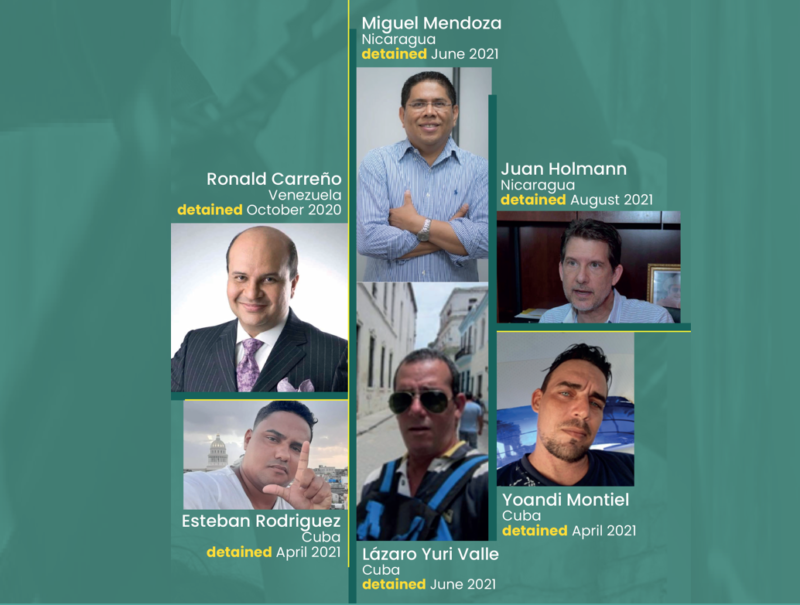
Violence & Impunity: Protecting Journalists in Colombia & Mexico
Violence against journalists is fortunately uncommon in many Latin American countries. But in some parts of the region it is of great concern.
On August 31, 2021, the Inter-American Dialogue supported the press conference “Latin American Press Under Siege” organized by Fundamedios and with additional support from the National Press Club (NPC) Freedom of the Press Committee, Voces del Sur, Race & Equality, the Inter American Press Association, the Pan American Development Foundation (PADF), IFEX-LAC, PEN-America, PEN-International, AMARC-LAC, Committee to Protect Journalists (CPJ), and the Special Rapporteur for Freedom of Expression of the Inter American Commission of Human Rights (IACHR).
The press conference focused on the escalating persecution of journalists across Latin America and called for the immediate release of detained journalists in Nicaragua, Venezuela and Cuba. The panel was moderated by Dagmar Thiel, CEO of Fundamedios, and consisted of Tifani Roberts, journalist for Univision, Anibal Toruño, founder of Radio Dario in Nicaragua, Armando Chaguaceda, columnist for the Havana Times, Luz Mely Reyes, director of Efecto Cocuyo in Venezuela, Carlos Roa, journalist for APEVEX, and Pedro Vaca, special rapporteur for freedom of expression at the Inter-American Commission of Human Rights (IACHR).
The president of the NPC Press Freedom Committee, John Donnelly, began the event by expressing the NPC’S grave concern for the increasing persecution of journalists throughout the Latin American region, stating that the NPC calls for the immediate release of detained journalists in region. Thiel also highlighted the unsafe and precarious environment in which journalists in the region find themselves today, explaining, "journalists are subjected to killings, kidnappings, arbitrary detention, exile, imprisonment, and judicial harassment while facing online threats and attacks. In the last 20 months, at least 27 journalists were killed across Mexico, Honduras, Brazil, Colombia, Ecuador, Guatemala, and Venezuela." Panelists described the violation of the right to freedom of speech and press in each of the three countries. Despite differing views and experiences, the panelists provided similarly worrying depictions of the state of press freedom in Latin America and echoed the common theme that “journalism is not a crime."
The hazardous situation for journalists in Nicaragua was described by Roberts, who delineated the gradual demise of freedom of speech in Nicaragua following nationwide protests in 2018. Roberts recalled her own experiences of harassment and stated that the persecution of journalists and their families has lead to both a mass-exodus of Nicaraguan journalists and a pattern of self-censorship by those journalists who remain in the country. She introduced the case of Miguel Mendoza, a sports journalist who was arbitrarily arrested by Nicaraguan authorities and has, as of August 31st, been imprisoned for more than 71 days without an official court order. Toruño provided a similar recount of repression and the role the oversized Nicaraguan police force plays in this repression, targeting journalists and their families. He summarized by stating: “being a journalist is now a sentence.”
The panel shifted its focus to the situation in Cuba, on which Aguaceda provided his insight. He explained that the new civic movement on the island has created a wave of citizen journalists who are now being persecuted by the Cuban state, citing the arbitrary arrests of three Cuban journalists and media influencers: Lázaro Yuri Valle Roca, Yoandy Montiel and Esteban Rodriguez. Aguaceda finished his remarks by stating that the situation in these countries is not an “ideological struggle” but rather one of a battle between “autocracy and democracy.”
Representing the Venezuelan Association of Journalists Abroad, Roa expanded on the Venezuelan context and the systematic dismantling of press freedom employed by the Maduro regime in Venezuela. Roa presented the cases of Roland Carreño, Eduardo Galindo, and Jesús Medina, three journalists, who, in conjunction with 13 others, are being arbitrarily held by Venezuelan authorities. Reyes’ personal recollection of her persecution as a journalist in Venezuela echoed the situation presented by Roa. She echoed comments made by Roberts on the pressure to self-censor as journalists and labeled the situation in the country as a pandemic of censorship.
Remarks by Pedro Vaca, special rapporteur for freedom of expression of the IACHR, expressed concern for the conditions experienced by journalists all over Latin America today, but particularly in Venezuela, Cuba, and Nicaragua. Vaca warned of the deteriorating rule of law in the region and his worries of further negative impacts on press freedom. Calling upon the international community, Vaca culminated his remarks by stating that “the hemisphere has the democratic duty to be aware of the example that these three countries set and the impact it could have in the region.”
The event concluded with a Q&A session in which panelists described what steps should be taken in ameliorating the situation of press freedom in the hemisphere. While Roa argued for an expansion of sanctions by the US government, both Toruño and Roberts insisted on a more regional and grassroots-based approach to solve the problem. Reyes echoed their comments and pushed for an increased sense of solidarity for journalists, advancing the idea for the creation of legal channels and humanitarian assistance for fleeing journalists.
Violence against journalists is fortunately uncommon in many Latin American countries. But in some parts of the region it is of great concern.
If Spain fails to have the Common Position lifted or if it succeeds and Havana again turns down European economic cooperation, then Cuba wins once more.
Citizen security remains a top concern for most Latin American governments as crime and violence spiral out of control and cripple political and economic institutions in the region.
 Fundamedios
Fundamedios